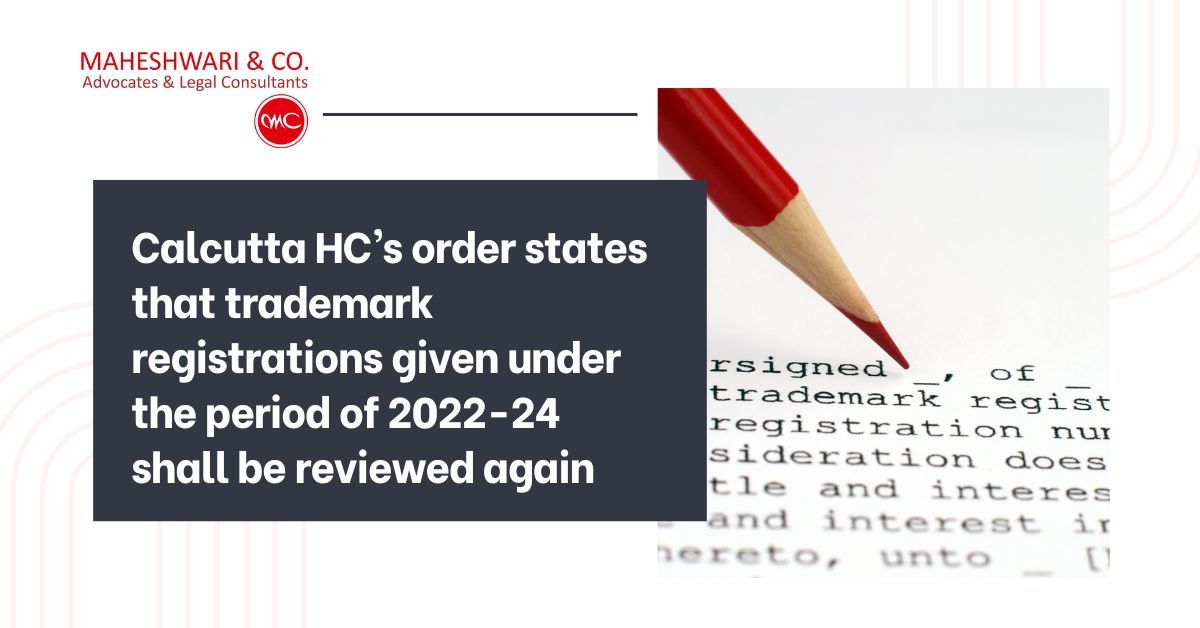A recent judgement involved three appeals under Section 91 of the Trademarks Act, 1999 [https://ipindia.gov.in/acts-rules-tm.htm] which comprised of the common question, “Whether the Associate Manager of Trademark is empowered to pass the impugned order?” This implies a question being raised on the decisions and orders made by the Associate of Trademark and if its decisions related to registrations and non-registrations are acceptable, to be rejected or reviewed during the time period it exercised its power. (2022-24)
Reasons for trademark registrations to be reviewed
The main contention of the appellants was that the Associate of Trademark has no authority under law and is not competent to pass any order. This is because of the following reasons:
- The order provided for Shri Shraman Chattopadhyay (Associate of Trademark) to be appointed as “Hearing Officer” in the Trademarks Registry on a contractual basis up till 31st March 2023 and nothing beyond. The order passed was in 16th September, 2023 which was beyond his appointment which makes the order to be set aside due to lack of jurisdiction.
- The order provided for several powers and duties like hearing of show cause matters, conduct hearings etc to a total of six officials of the Trademark registry with the Associate of Trademark having no such power or duty.
- The notification provided that there is no post of Associate Manager of Trademark Registry in its organisational structure, having no mentioning in the hierarchy of the Recruitment Rules.
- Based on the case of Intellectual Property Attorneys Association v. Union of India, 2014 SCC Online Del 1912 [https://indiankanoon.org/doc/19051638/] , and on reading of the scheme of registration in Trademark Act, the power vested in the Registration of Trademarks is quasi-judicial powers.
Defences in favour of the Associate Managers
The main contention of the respondents was:
- If the Officer was not competent to pass an order, then the appeal is not maintainable in the eyes of law.
- These officers were appointed by public notice on a contractual basis to hear the contested matters relating to applications and dispose of the opposition by passing reasoned decisions as per law.
- An order provided that various functions of the Registrar shall be delegated through e-module of the TMR system upon directions of the Registrar by System Administrator. Another order also authorized Trademark Registries of Ahmedabad, Chennai, Kolkata, Mumbai and Delhi to allocate/assign works to contractual manpower deployed at their locations through QCI, the head office in Mumbai is also authorised to allocate/assign the work to contractual manpower deployed through QCI at PIS/RGNIIPM, Nagpur which is declared as out-station unit of TMR Mumbai, which was done in the present case.
- Based on the case of JK Medical System Private Limited v. Union of India reported in WP No. 3364 of 2020 [https://indiankanoon.org/doc/8033556/] , order dated 13-10-2023 (Mad), the Act doesn’t enclose fetters on powers of the Central govt to appoint and authorise officers of any designation to undertake quasi-judicial functions.
- Based on the case of Prasun Roy v. Calcutta Metropolitan Development Authority, (1987) 4 SCC 217 [https://indiankanoon.org/doc/1311958/] , if parties have agreed to the method of appointment with full knowledge, they would be precluded from objecting to such appointment.
Visa International Ltd. v. Visa International Service Association and Another, Visa International Ltd. v. Visa International Service Association and Another, Garden Silk Mills Private Limited v. Rajesh Mallick and Others [https://indiankanoon.org/doc/181304553/]
Based on the above contentions, the judgement concluded that the term ‘other officers’ in sub-section (2) of Section 3 of the Trademarks Act indicates that they should be from the cadre of officers for the purpose of discharging the functions of Registrar, under its superintendence and direction. Quasi-judicial functions are required to be performed independently and not subject to the superintendence and direction of the Registrar. The intention is to empower the delegation of administrative power and not quasi-judicial power. Additionally, the Associate Managers had exercised their powers beyond their stipulated time frame, for which no extensions of their time frame were proved. Thereby, orders passed by Shri Shraman Chattopadhyay were set aside and quashed. As incidental to this, all matters decided by the Associate Manager have been remanded to the Registrar, to decide the matter afresh by a competent officer after giving an opportunity of hearing to all parties and dispose of the matter within six months from the date of receipt of order.
Concluding remarks
As a result of the above judgement, all registrations given under the time-frame of 2022-24 by the Associate Manager, Shri Shraman Chattopadhyay have to be reviewed again. The question of “Whether the Associate Manager of Trademark is empowered to pass the impugned order?” was clearly answered as negative, especially after the lapse of its stipulated time frame.






